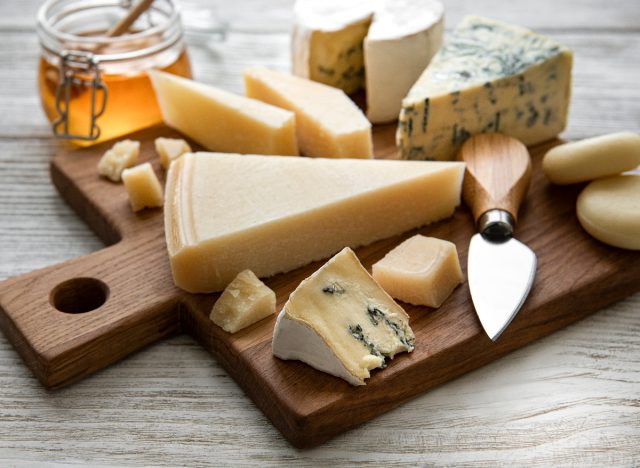When you’re focused on losing belly fat, there are many foods you may want to avoid consuming regularly. Although protein is an excellent addition to any healthy diet, as it helps keep you full and preserve lean muscle, not all proteins are created equal. Eat This, Not That! spoke with The Nutrition Twins®, Tammy Lakatos Shames, RD, CDN, CFT, and Lyssie Lakatos, RD, CDN, CFT, who sit on our Medical Expert Board, and learned the #1 worst protein for belly fat. Keep reading to learn more, and when you’re finished, be sure to check out The Easy & Effective 5-Day Weight Loss Meal Plan Dietitians Swear By.
What is the worst protein for belly fat?


Drumroll, please! Many of you are not going to like this answer, but the absolute worst protein for belly fat is cheese. Although it’s a stellar source of both protein and calcium, cheese is super bad when you’re concerned about belly fat.
The Nutrition Twins explain, “Most of the calories in cheese come from fat rather than protein. In fact, an ounce of mozzarella cheese has about 85 calories with 60 calories coming from fat and only 23 calories of the cheese coming from protein. Fat calories add up quickly, so even a small portion of a cheese can quickly add up in calories. On the other hand, you can have a much larger portion of a high-protein food for a lot fewer calories.”
Interestingly, most individuals don’t even consider cheese as their primary protein in a meal. It doesn’t get the respect that salmon, grilled chicken, tofu, or eggs do. People usually use cheese far too liberally as a fun addition to their protein, similar to the way they’d use a sauce or condiment. This habit, unfortunately, leads to extra unwanted pounds.
“Plus, to get the same satisfying 30 grams of protein you’d get in 163 calories of chicken breast, you’d have to get 560 calories of a cheese like mozzarella,” The Nutrition Twins add. “Most people add this to their already high-calorie burgers, meat lasagna, [pastas, and loaded salads].”
What’s a healthier protein alternative to cheese?


If cheese rocks your world, you should consider low-fat or nonfat cheese. “When some or all of the fat is skimmed from cheese, calories decrease while protein typically increases,” The Nutrition Twins explain. “Protein increases satiety, so the more protein you can get in a food, the less hungry you’ll be and the less likely you’ll be to overeat. For example, two ounces of nonfat mozzarella cheese has 84 calories and 18 grams of protein while two ounces of full-fat mozzarella cheese has twice as many calories—170 calories and significantly less protein (12 grams of protein).”
Low-fat or nonfat cottage cheese is a weight-loss-friendly protein choice as well. A half-cup of cottage cheese contains around 90 calories and offers 12 grams of protein. “Although both cottage cheese and nonfat cheese are both dairy products, neither one contains artery-clogging saturated fat,” The Nutrition Twins add.
Why is eating protein for weight loss important?


Protein is the real MVP when it comes to weight loss, as it fills you up and keeps you feeling satisfied after a meal. It also keeps your blood sugar stable, which helps you avoid energy crashes that lead to unhealthy food cravings. In addition, it helps build and repair muscle tissue, which your body needs for strength and a fast metabolism.
“While protein has been shown to be helpful for weight loss, if you consume protein that also is loaded with fat or sugar, it quickly adds up in calories that can contribute to weight gain, and/or it can create inflammation in the body that makes weight loss harder,” The Nutrition Twins say.
Alexa Mellardo

